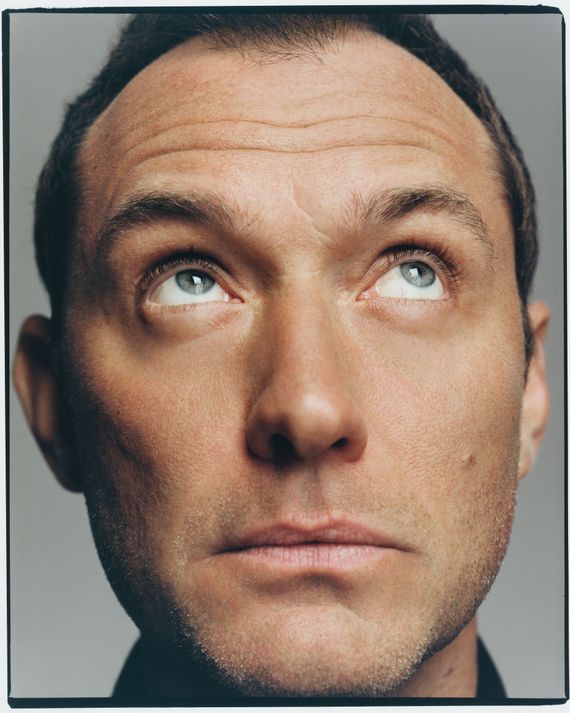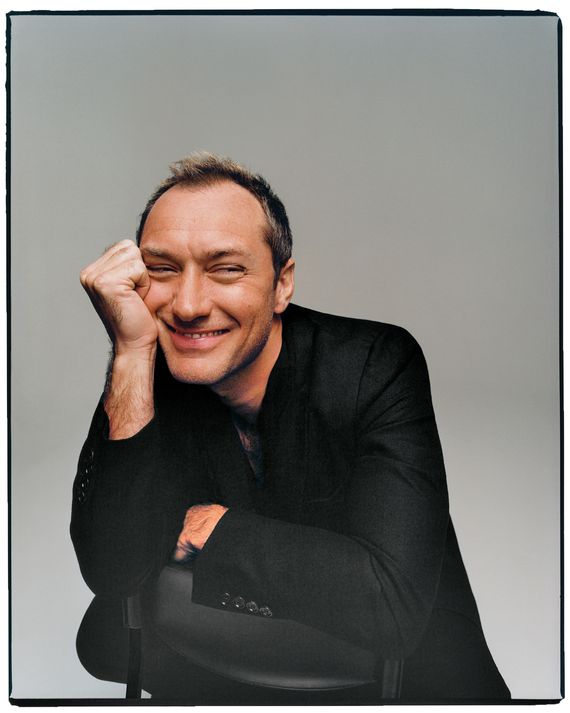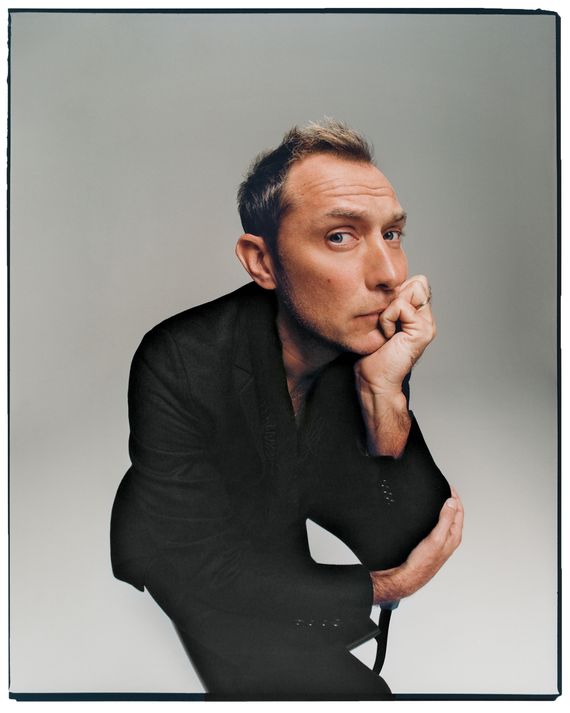
Jude Law is looking at art. I am looking at Jude Law.
He walks deliberately and unhurriedly through the Los Angeles County Museum of Art, as though he’s doling out each step as a treat for the early risers this November morning. When he squints to examine a work, a fine spray of crow’s-feet sprouts alongside his temples. His hair, a fading blond, has grown sparse along his widow’s peak — a testament that no man can survive the erosion of time.
But I think he would agree it’s all for the best, his handsome looks still intact but honeyed with age and freed from the burden of perfection. At 47, Law can now be mortal, a far more interesting place to be as an actor. “People talk about getting into your mid-40s as a turning point, and I really felt it — this sort of ahhh, ability to breathe,” he says. “It’s not about proving; it’s not about feeling like you need to be cutting edge. You take your time a little more and perhaps feel a little more confident in your own skin and your own little journey, as opposed to the impact you’re gonna make.”
How ironic, then, that his role as the charismatic, imperious American pontiff, Lenny Belardo, in HBO’s 2016 series The Young Pope and its sequel, The New Pope, leans into his beauty to the point of the absurd. Paolo Sorrentino envisioned an unlikely scenario for the show: The seat of political power in the Catholic Church, a space traditionally for the stooped and gray, would be filled by someone undeniably good-looking. This would be beauty as divine right, a blessing from the heavens that makes the pope float above the mortal coil. Sorrentino imagined an actor like Paul Newman; his wife suggested Law.
“Jude doesn’t like the fact that, for the world, he’s a sex symbol,” says Sorrentino. “I like to be provocative with him and say, ‘I have an idea about the fact that you are a beautiful man.’ He would love to kill me. But then he says, ‘Yes, I’ll do that.’ ” In Sorrentino’s hands, Law’s own persona becomes an added layer of significance, another opportunity for play. In a teaser for The New Pope, Law struts down the Lido wearing an ecclesiastical-white Speedo, prompting a collective call for smelling salts (and poppers) on the internet. The opening scene goes further: A comatose Lenny lies on a bed, completely naked save for a serviette covering his genitals like a fig leaf, as a nun sponges him down. Overcome by the sight, she masturbates on the couch.
It’s objectification with a smirk, the Holy Father as the ultimate unfulfillable fantasy. Law gamely embraces the part with a verve reminiscent of his youth. “What does that [boldness] come with?,” he says, laughing, as he recalls filming the scene with the teeny napkin. He pulls out his phone and shows me a photo of Sorrentino cheekily holding up his costume for the day. “With knowing that you’re getting older and you might as well make the most of it while you can, before bits fall off and you get gray and saggy, which is the way of all.” He goes on, “Living with those perceptions means that you’re playing with it, too.”
In Law’s youth, his beauty was blinding. His face had the kind of golden symmetry the ancient Greeks would have gilded with praise, a pulchritude that could inspire you to risk your life. It became a recurring theme in the roles he played, particularly in the late ’90s. In 1997’s Wilde, the titular writer (played by Stephen Fry) goes to prison for his affair with Law’s picturesque but talentless Bosie. In that same year’s Midnight in the Garden of Good and Evil, he plays an erratic, tempestuous prostitute whose murder sets the stage for the rest of the film. In Gattaca, also in 1997, he is a genetically ideal man; a suave, dancing robot gigolo in A.I. Artificial Intelligence (2001); and a Dorian Gray–like vampire in Immortality (1998).
Then there’s The Talented Mr. Ripley (1999), in which Law glitters with cruelty as Dickie Greenleaf, a gadabout lounging around the beaches of Italy. He is charismatic because he doesn’t care and doesn’t have to. Law is so incandescently good as Dickie that even though Matt Damon’s Tom Ripley kills him before the halfway mark, his image is burned onto the viewer’s retinas. He is the embodiment of true privilege: the kind you are born into that can never be taken away. Coveting it costs you a piece of yourself or maybe your sanity. The late director Anthony Minghella innately understood something about Law’s beauty — its glimmer of danger, like a cool blade held against your throat.
Law received his first Oscar nomination for the part (his second, a few years later, was for another collaboration with Minghella, in which he did a heel turn as the taciturn Inman in Cold Mountain). He still thinks of the director as one of the few people who understood who he was as an actor. “Anthony saw my potential and breadth,” he says. “It was like he was looking into my soul. He could ask me to do anything, and I would try and pull it off.”
The long stretch of films that came after Ripley never quite utilized him as interestingly (2013’s Dom Hemingway, for example, is a great performance in a mediocre film). Law has remained prolific over the years, traversing genre and scale, doing tentpole franchises like Fantastic Beasts: The Crimes of Grindelwald (2018), Captain Marvel (2019), and Guy Ritchie’s Sherlock Holmes films, while pursuing smaller, stranger movies (most recently, 2018’s Vox Lux and the upcoming Sundance premiere The Nest), perhaps never more so than in 2004, when he appeared in five feature films released over four months. Two of those movies — Sky Captain and the World of Tomorrow and Alfie — were leading-man vehicles that were also critical and box-office bombs.
Alfie in particular felt like an attempt to establish Law as a commercially bankable star (he was on the cover of New York at the time) yet fundamentally misunderstood what was compelling about him to begin with. It was dated from conception (the title character calls his penis “Big Ben”), the sort of post–Sex and the City movie that happens when you confuse aesthetics for the superficial: a shallow portrait of a shallow man.
At the 2005 Oscars ceremony, host Chris Rock rubbed salt in the wound, joking, “If you can’t get a star, wait. If you want Tom Cruise and all you can get is Jude Law, wait! It’s not the same thing. Who is Jude Law? Why is he in every movie I have seen the last four years?,” before adding, “Next year, he’s playing Kareem Abdul-Jabbar in a movie.” The dig still stings. “I’m going to be really candid,” Law says. “Chris Rock slagging me off at the Oscars was upsetting. It felt like, Fuck, am I that guy that you point fun at? Obviously, I’ve realized since that a gag is a gag is a fucking gag. Whatever, it could’ve been anyone.” He pauses, maybe worried that he has said too much. “It was probably a bubble that needed bursting around myself. Like, Oh, this could be brutal. This isn’t all plain sailing.”
In the post-Alfie years, the shallowness of the role seeped into his personal image and became difficult to shake. The films he did often looked right on paper but failed to hit the Zeitgeist (think My Blueberry Nights or All the King’s Men). Meanwhile, he became daily chum for the British tabloids: His relationship with Sienna Miller (they met on the set of Alfie) and its tumultuous on-again, off-again nature was regularly chronicled on the covers. Jude Law slept with the nanny! Sienna Miller slept with Daniel Craig! Of course, Law and Miller were just two victims of a much more vast network of cell-phone hacking conducted by Rupert Murdoch’s News Corp., but the damage had been done.
“You see this Frankenstein’s monster being created, this puppet that has your name and your face attached, and it’s an odd thing,” says Law. “Because you don’t want to say, ‘That’s not true.’ [But] to address it or argue it is giving it limelight. And so over the years, I’ve just retracted. You change your life so you’re not so exposed — what to avoid and how to live a life that’s slightly less obtainable.”
In person, Law is well practiced in the art of avoidance: unfailingly polite but deeply private in a way that has been learned and hard fought. He answers questions at length while avoiding specificity, like an athlete running down the clock. He does not have an official Instagram. He isn’t on Twitter. And the years have made him realistic about the business. “I wouldn’t say that I necessarily do an awful lot of work for money, but there’ve been a couple jobs where I figure, Gosh, I actually need to make some money. When the work you do is also to put bread and butter on your kids’ table, it has to be,” he says. Law has five children — three with his first wife, Sadie Frost; one with Samantha Burke; and his youngest, with Catherine Harding. “I have quite a big responsibility base that I need to support. That’s just a reality check. I’m constantly going through battles with my relevance, my integrity, or sense of self as an artist.”
We’re standing in front of Julie Mehretu’s painting Cairo, a 10-by-24-foot map of many layers: architectural, geographical, sociopolitical, emotional. It’s a “palimpsest” of history, as the curatorial notes put it. Law is particularly taken by the word. “I love this idea that history is made one layer on top of another, erasing itself, consuming itself, inventing something else for the same thing,” he says. It is not unlike the best of what he hopes his work can be, something that manages to capture not only who he is now but what has brought him to that point. “They say, ‘You are your last film,’ ” he explains. “If you get the opportunity to put yourself out there in a film or television show or a play, it has to be that pound of flesh. It has to be, ‘Who am I right now? Where have I gotten to?’ ”
His role as Lenny (Pope Pius XIII) is a revitalization. A reminder of a young Jude Law, only sedimented with age and complexity. Whereas early in his career, Law’s beauty made him the object of desire, in the The Young Pope it’s the source of his power, like a golden scepter that forces people to submit to his will. Lenny uses it to chillingly authoritarian ends. He wants a conservative Church — one that does not compromise, does not make concessions, but inspires devotion precisely because it is hard. Demagogue or demigod, what’s the difference?
“The beauty of Jude was very helpful for the character because the quintessence of beauty as pope was something, not provocative, but unpredictable,” Sorrentino says. “Beauty is something that changes the relationship between the pope and all the people around. All the men, all the women. [It] puts the people in a different condition.” Read in another light, Sorrentino’s shows are a meditation on stan culture and beauty as a social force. We are sad, simple creatures in its presence, reflexively equating looks with a moral good. Sorrentino can find only the Italian word for it: soggezione, translated as “awe.” “For me, when I meet a man or a woman who is beautiful, I have a sort of strange, instinctive respect,” he says with a shrug. “I don’t know why. I have problems.” And beauty combined with political power of the highest religious magnitude? We tremble, we weep.
Law’s character spends much of The New Pope in a coma (Pius XIII collapses in the finale of The Young Pope), suspended between life and death. His absence hangs over the rest of the characters (sometimes he visits them as a sexy ghost) and inspires a rabid idolatry in the masses. His followers wear black hoodies emblazoned with Pius’s photo, as though they were at a concert. Meanwhile, his successor, Sir John Brannox, a British socialite played by John Malkovich, advocates “the middle way,” but the world has been shaped in the image of Pius’s extremism. He has already won.
Law’s performance as Pius is virtuosic. Power convulses off him not only through what he says but what he doesn’t. He is restrained, forcing his subjects to hang on to every flickering gesture. (In The New Pope, they literally hang on to his every breath.) “It was really lovely playing someone who was so still. In a way, I hope the stillness has somehow offered new insight into the journey I took to become that still,” Law says. “My acting coach, who I’ve been working with for nearly ten years, kept saying to me, ‘You are enough.’ What I recognized finally was that if you do the work, you don’t have to project the work. The work is. I felt a confidence, I suppose, with Lenny — and a demand. There was nowhere to hide with [him].”
Law is interested in the just being–ness of acting. He enjoys pushing his own body to extremes as a way to get in touch with himself. Right now, he’s intermittently fasting, eating only between noon and eight. No booze, very little red meat. “I love restricting what I’m eating, like really starving myself and only drinking water and eating like pulses and vegetables,” he says. “And then I love excessive banquets, trying different types of foods and wines. I mean, we’re only here once, right?”
We walk up to the second floor for the rest of Mehretu’s retrospective. Law loves the idea that he is “just meeting” her now and gets to take in this fully formed artist’s evolution over the past 30 years. It’s a feeling that hits home. What if people were just meeting him now? “I am pleased with The Young Pope and The New Pope,” he says. “Had you asked me about some of the other stuff I’ve done in the last five years, it would make me say, ‘Please go back! Look at the journey, not just at the immediate.’ ”
*This article appears in the January 20, 2020, issue of New York Magazine. Subscribe Now!



